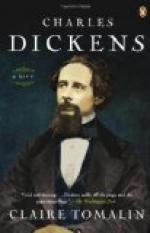self-interest exclusively; and the boy becomes a cub
and a mean thief, and the girl marries, quite without
love, a certain blustering Mr. Bounderby, and is as
nearly as possible led astray by the first person
who approaches her with the language of gallantry
and sentiment. Mr. Bounderby, her husband, is,
one may add, a man who, in mere lying bounce, makes
out his humble origin to be more humble than it is.
On the other side of the picture are Mr. Sleary and
his circus troupe; and Cissy Jupe, the daughter of
the clown; and the almost saintly figures of Stephen
Blackpool, and Rachel, a working man and a working
woman. With these people facts are as naught,
and self-interest as dust in the balance. Mr.
Sleary has a heart which no brandy-and-water can harden,
and he enables Mr. Gradgrind to send off the wretched
cub to America, refusing any guerdon but a glass of
his favourite beverage. The circus troupe are
kindly, simple, loving folk. Cissy Jupe proves
the angel of the Gradgrind household. Stephen
is the victim of unjust persecution on the part of
his own class, is suspected, by young Gradgrind’s
machinations, of the theft committed by that young
scoundrel, falls into a disused pit as he is coming
to vindicate his character, and only lives long enough
to forgive his wrongs, and clasp in death the hand
of Rachel—a hand which in life could not
be his, as he had a wife alive who was a drunkard
and worse. A marked contrast, is it not?
On one side all darkness, and on the other all light.
The demons of fact and self-interest opposed to the
angels of fancy and unselfishness. A contrast
too violent unquestionably. Exaggeration is the
fault of the novel. One may at once allow, for
instance, that Rachel and Stephen, though human nature
in its infinite capacity may include such characters,
are scarcely a typical working woman and working man.
But then neither, heaven be praised, are Coupeau the
sot, and Gervaise the drab, in M. Zola’s “Drink”—and,
for my part, I think Rachel and Stephen the better
company.
“Sullen socialism”—such is
Macaulay’s view of the political philosophy
of “Hard Times.” “Entirely right
in main drift and purpose”—such is
the verdict of Mr. Ruskin. Who shall decide between
the two? or, if a decision be necessary, then I would
venture to say, yes, entirely right in feeling.
Dickens is right in sympathy for those who toil and
suffer, right in desire to make their lives more human
and beautiful, right in belief that the same human
heart beats below all class distinctions. But,
beyond this, a novelist only, not a philosopher, not
fitted to grapple effectively with complex social and
political problems, and to solve them to right conclusions.
There are some things unfortunately which even the
best and kindest instincts cannot accomplish.




